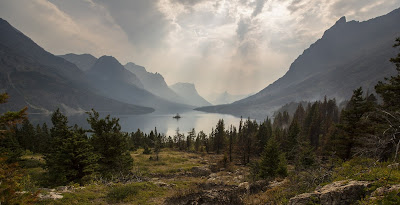Are We Too Civilized for Wild Places?
“In wildness is the preservation of the world.”
Henry David Thoreau, the author of that quote, noted how he needed time in nature. He couldn’t understand how people could spend all day, for days on end, indoors.
I can relate.
But Thoreau wrote those words over 150 years ago. Society is different now. Right?
The definition of wildness varies from person to person. To many, wild areas are as abundant as the wooded areas just beyond the rough on a golf course. Anything un-mowed, unplowed, undeveloped and inaccessible by car or cart is equivalent to, and seemingly as dangerous as, the untamed wilderness America’s pioneers beat back to create our current civilized culture.
That the lack of wild areas in our world is synonymous with being “civilized” reflects a gross misunderstanding of what actually feeds our souls.
Next month, naturalists from my department will take six high schoolers to a wilderness area in Colorado. I look forward to hearing about the impact such an experience has on them. My guess is, at the very least, it will instill an appreciation for wild places. In return, they’ll want to protect that which is natural, wild, and free. That, I believe is something that would benefit all of us.
We all need wild places.
Burlington’s own Aldo Leopold wrote, “Wilderness is the raw material out of which man has hammered the artifact called civilization.” Yet today it’s common to shun that from which our so-called civilization was forged.
I feel a reversal of course is warranted.
Such avoidance of wild places is contrary to our core instincts. Research is increasingly showing how a disconnection from nature is bad for us and how reconnecting with it can be immensely beneficial, likely in ways we don’t fully understand yet.
Anecdotally, I know this is true. Growing up, I spent endless hours in the swamps and bottomland forests south of Burlington in the very southeasternmost part of the county. My “wilderness” was a couple thousand acres of largely untamed Mississippi and Skunk River floodplains. There, I could get so far away from modern civilization that no human sounds could be heard at times. It was as if I was the only person on the planet.
To some, such a thing may sound like torture. But to me, it was therapy. As a scrawny kid with low self-esteem, mild depression, and little confidence, I didn’t have to conform to society’s expectations out in the forest. In the wild, I could just be me. I could bask in the knowledge that no matter what happens, nature endures. Those trees and waterways got there without my having to do anything, and they’d be there long after I left. It was peaceful, calming, restorative.
But most people don’t have access to such places, especially as the dings and dins of modern society envelop us deeper. And true wilderness, the type of human-less place that inspired the likes of Leopold, Thoreau, Muir and others, simply doesn’t exist around here. The closest designated wilderness areas are a day’s drive away.
Yet even those rare places are under attack by those that fail to see the value in wildness. The federal government recently opened mineral leasing in 365 square miles of the Superior National Forest potentially paving the way for future mining in the watershed that contains Minnesota’s Boundary Waters Canoe Area Wilderness.
A recent study published by The Wilderness Society states that since 2016, nearly 17 million acres of publicly owned land has been offered for lease to energy companies. Most of those lands, according to the report, are in the top 25 percent of wildest places in the nation.
It’s easy to ignore the loss of true wilderness in America because we don’t have any here where we live. Iowa’s wild lands were cut, drained, and plowed generations ago. Today, we reside on the most altered landscape on the planet.
Which makes access to true wilderness even that much more impactful to Midwesterners like us. Hence the reason we’re putting forth the effort here at Des Moines County Conservation to connect people with such places.
I think we all have some part of our soul that draws us to wild places. It’s why visitation to national parks is at all time highs, despite (or maybe in spite of) how developed and technologically “advanced” the world around us has become. It’s why people describe trips to designated wilderness areas as “life changing.” It’s why nature therapy is an accepted health practice in places around the world, proven to treat stress and depression better than Prozac for many people.
I don’t know if in wildness is the preservation of the world. But I have no doubt our civilized world will certainly benefit from the preservation of what little wildness it still contains.
This is a modified piece that originally appeared in my "Living Land" column in The Hawk Eye.
Like these posts? Subscribe here to get future Outdoor Executive Dad posts sent right to your inbox.
Like these posts? Subscribe here to get future Outdoor Executive Dad posts sent right to your inbox.


Comments
Post a Comment